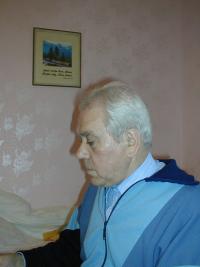As I´m religious person I can´t be angry with them, but I can´t say that I would kiss the communist.

Download image
Mr. Jiří Pokorný has been strongly religiously based every since he was a young boy. And it was his affiliation to the Church that fundamentally influenced his life to come. Being an Adventist he refused to work on Saturdays which caused him stay in jail twice. He was born on October 6th 1933 in Prague. His father was a mechanical stoker on locomotives. His mother was at home taking care of four children and the entire household. She worked occasionally. After the grammar school which Mr. Pokorný visited in Prague-Holešovice, he attended one-year teaching bricklayer course. After that he worked as a bricklayer until the fall of 1953 when he joined the army. After first two periods of the military service in Havířov town the military counterintelligence lieutenant Novakovski pressed charges against Mr. Pokorný. He was then sentenced by military court under the section 270/b for the avoidance of the military service to eighteen months unconditionally. Right after the verdict he has been escorted from Havířov to the military prison in Špilberk, where he boarded to serve the sentence on February 11th 1955. After short while he has been transported firstly to Cejl prison (in Brno town) and then to labor camp in Rtyně v Podkrkonoší town. There he was working on construction of houses for the warders. In Rtyně however, he spent only three months (until May 11th 1955). After that he was released on amnesty. The next six months Jiří Pokorný spent as a laborer on the construction. A new call up to the military came on November 16th 1955. Accompanied by his friend Jenda Fila - Adventist as well- he joined the military service in Komárno town. It didn´t took too long for the history to repeat itself. And it was again Lt. Novakovski who pressed charges against him and this time also against his friend Jenda Fila for avoidance of the military service. The second sentence Jiří Pokorný served again firstly in Špilberk and in Cejl prison nearby Brno town. After short intermezzo in Pankrác prison in Prague was Mr. Pokorný and others transported to Jáchymov town prison. After one year spent in labor camp Barbora he was transferred to Vykmanov labor camp, where he spent the next two years. After serving his second sentence (he was released in May 1958) Mr. Pokorný was then supposed to join the mandatory military training again. Because he knew the consequences he might have been suffering again (and there was a reasonable chance that he may not be able to survive the third time in communist camp) he decided to do, what many of the military service objectors were doing at that time and he agreed to the ten-year work in Kladno black coal mines. After few years there he got seriously injured during the caving. It caused him one year in bed. Even today, Mr. Pokorný still bears the consequences of his stay in labor camps as well as the hard work in the mines. His health is in poor condition. He remained childless.
